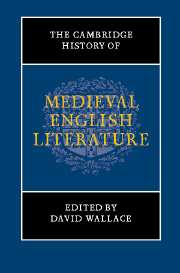Book contents
- Frontmatter
- I AFTER THE NORMAN CONQUEST
- Introduction
- 1 Old English and its afterlife
- 2 Anglo-Norman cultures in England, 1066–1460
- 3 Early Middle English
- 4 National, world and women’s history: writers and readers in post-Conquest England
- 5 Latinitas
- 6 Romance in England, 1066–1400
- II WRITING IN THE BRITISH ISLES
- III INSTITUTIONAL PRODUCTION
- IV AFTER THE BLACK DEATH
- V BEFORE THE REFORMATION
- Chronological outline of historical events and texts in Britain, 1050–1550
- Bibliography
- Index of manuscripts
- Index
Introduction
from I - AFTER THE NORMAN CONQUEST
Published online by Cambridge University Press: 28 March 2008
- Frontmatter
- I AFTER THE NORMAN CONQUEST
- Introduction
- 1 Old English and its afterlife
- 2 Anglo-Norman cultures in England, 1066–1460
- 3 Early Middle English
- 4 National, world and women’s history: writers and readers in post-Conquest England
- 5 Latinitas
- 6 Romance in England, 1066–1400
- II WRITING IN THE BRITISH ISLES
- III INSTITUTIONAL PRODUCTION
- IV AFTER THE BLACK DEATH
- V BEFORE THE REFORMATION
- Chronological outline of historical events and texts in Britain, 1050–1550
- Bibliography
- Index of manuscripts
- Index
Summary
King Edward, later ‘the Confessor’, was buried in his newly constructed abbey of West Minster on the morning of 6 January 1066; Harold, Earl of Wessex, was crowned later that same day. Tostig, Harold’s brother, then allied himself with Harald Hardrada, King of Norway; both were defeated and killed by Harold’s forces at the Battle of Stamford Bridge, near York, on 25 September. When William of Normandy landed at Pevensey three days later, Harold marched south to London. He left London on 12 October and was killed at Hastings on the 14th. Wearing and bearing some of Edward’s regalia, William had himself crowned King of England at Westminster Abbey on Christmas Day. 1066, then, represents a solid bookend for English history, and hence literary history: chronicles written in England for centuries after devote inordinate space to this single, eventful year. Aristocrats and clerics from the Continent, recruited to rule and administer William’s newly conquered kingdom, arrive speaking French and Latin. Old English loses its royal and ecclesiastical sanction; early Middle English (always a problematic concept) evolves as a hybridized mother tongue with negligible textual authority. The massive transfer of wealth, land and privilege recorded by Domesday will not be rivalled in England until the Henrician revolution of the 1530s.
- Type
- Chapter
- Information
- Publisher: Cambridge University PressPrint publication year: 1999



